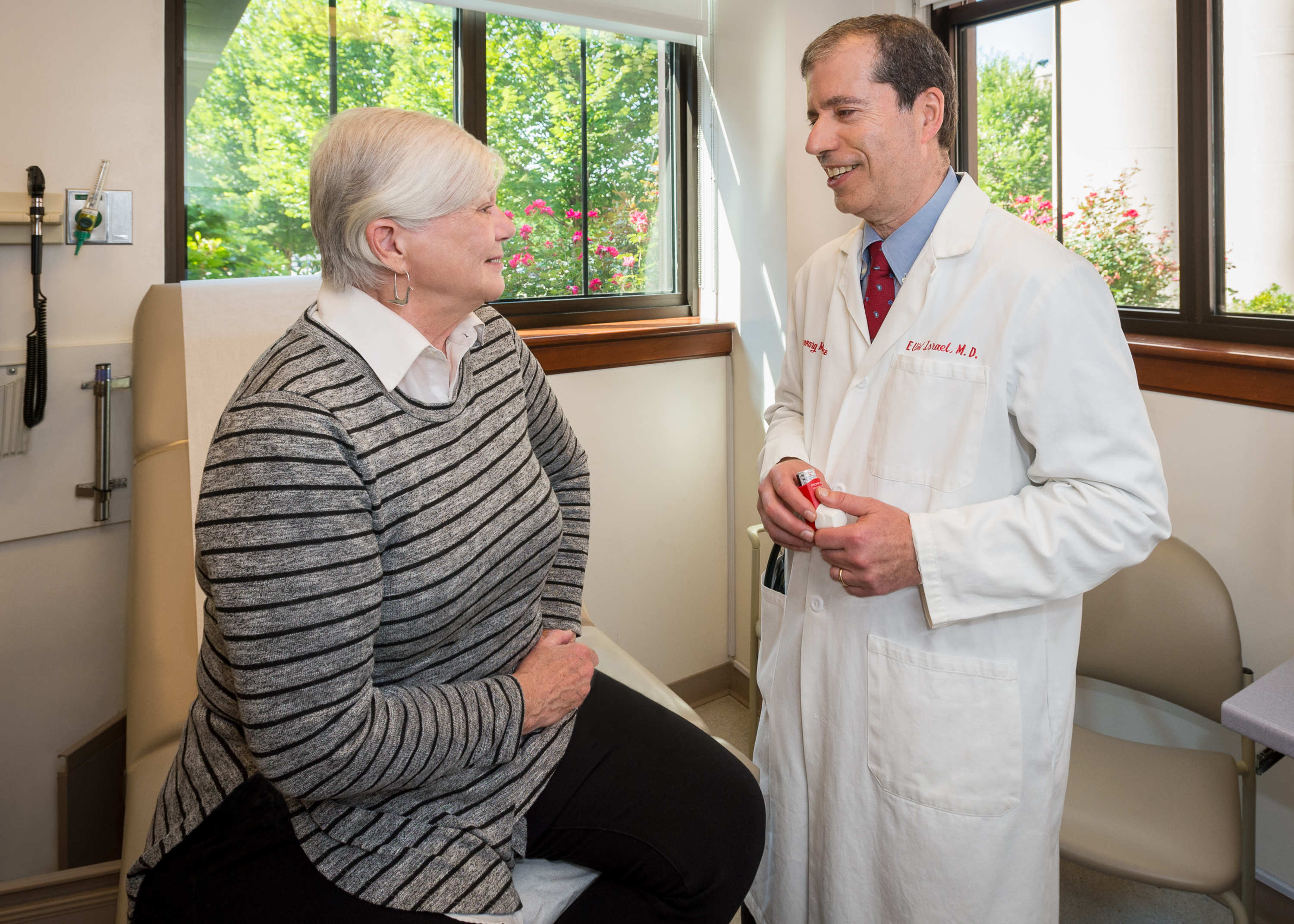
The Severe Asthma Program, part of the Partners Asthma Center, offers state-of-the-art diagnostic and therapeutic options that enable your patients with severe asthma to achieve improved respiratory health. Meanwhile, Brigham and Women’s Hospital researchers are discovering new therapies to manage the disease.
Research points to immunological differences in responses to steroids in patients with severe asthma, suggesting reasons corticosteroids may paradoxically perpetuate inflammation in severe asthma.
The cause of severe asthma and why corticosteroids are not an effective treatment have for a long time been a mystery – until now. Research led by a team of investigators at Brigham and Women’s Hospital (BWH) points to immunological differences in responses to steroids in patients with severe asthma, suggesting a reason why corticosteroids may paradoxically perpetuate inflammation in severe asthma.
“This research was an attempt to better understand the immunology of patients with severe asthma and to answer the question of why they don’t improve when taking corticosteroids,” said Bruce Levy, MD, chief of the Division of Pulmonary and Critical Care Medicine at BWH. “Our findings point to an interesting and pivotal role for natural killer cells in the asthmatic airway and suggest that continually giving high doses of corticosteroids may actually be making things worse.”
To amass the data to comprehensively characterize severe asthma, seven US asthma research centers joined forces to collect and share patient samples as part of the severe asthma research program-3 (SARP-3) Study funded by the National Heart, Lung and Blood Institute of the National Institutes of Health. Such samples included blood, sputum and exhaled breath samples as well as bronchoscopy samples from deep in the lungs.
Dr. Levy noted that by examining specimens that originate near the source from a relatively large number of well characterized patients with severe asthma, researchers could gain insights that had not been possible before.
“It was a unique opportunity to be a part of SARP-3 and focus on in-depth characterization of the immunology of the severe asthma airway using bronchoscopy samples obtained from patients across the country,” said lead author Melody Duvall, MD, PhD, a postdoctoral research fellow in the Levy lab and a physician in the Division of Critical Care Medicine at Boston Children’s Hospital.
Senior author Elliot Israel, MD, an allergist as well as a pulmonologist in the Division of Pulmonary and Critical Care Medicine, Drs. Duvall and Levy, and colleagues examined immune cells – focusing on lymphocytes – in samples from patients with severe asthma, patients with non-severe asthma and healthy control subjects. One important family of innate lymphocytes in the lung is known as natural killer (NK) cells, which are pivotal for both mounting an immune response and helping to resolve inflammation.
In patients with severe asthma, however, NK cells are disabled from resolving inflammation, and become outnumbered by other types of immune cells that provoke inflammation. Treatment with corticosteroids appeared to further suppress the ability of severe asthma NK cells to help clear inflammation.
“Due to the actions of corticosteroids on NK cells, patients with severe asthma who are on corticosteroids may be experiencing the side effects of the drug without receiving significant benefit,” said Dr. Levy.
New classes of drugs that target allergic asthma are emerging or close to market, but Dr. Levy notes that these new drugs are unlikely to help patients with non-type 2 inflammation in severe asthma.
Natural killer cells serve important roles in clearing non-type 2 inflammatory cells, so identification of a defect in NK cell function in severe asthma provides a window for the development of new therapeutic approaches.
Dr. Levy and colleagues observed that natural molecules called lipoxins did preserve NK cells pro-resolving functions. Unlike steroids, lipoxins are endogenous molecules that are being investigated to determine capacity to resolve inflammation as well as their cellular and molecular mechanisms for resolution. This study identified airway NK cells as a pro-resolving target for lipoxins; however, lipoxins are under-produced in severe asthma. Further studies of the relationship between severe asthma and pro-resolving mediators and their therapeutic potential are ongoing.
BWH Opens the Severe Asthma Program
Brigham and Women’s Hospital recently launched the Severe Asthma Program to provide a multidisciplinary approach to the care of patients whose asthma has been difficult to manage with conventional therapies. The program is co-directed by Dr. Israel and Christopher Fanta, MD, director of the Partners Asthma Center.
The Severe Asthma Program brings together a multidisciplinary team of specialists, including pulmonologists, allergists, otolaryngologists (voice experts, speech therapists, and experts in sinus disease and nasal polyps), gastroenterologists, and psychiatrists.